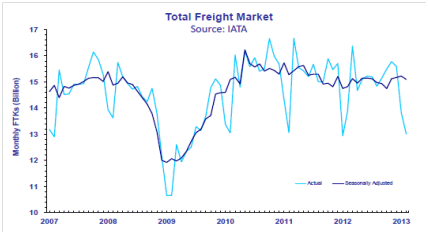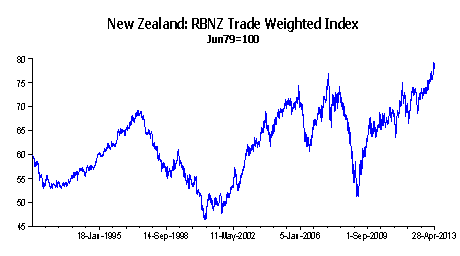Tyndall Monthly Commentary:Dangerous Assumptions Impact New Zealand
The strong dollar is doing little to help the economy but investors banking on it may be in for a sharp shock.
Friday, May 3rd 2013, 8:00AM
by Andrew Hunt

At present, the US and Japanese central banks are involved in massive bond purchase operations which are raising liquidity in both their banking and corporate sectors. Many of the funds that are being generated by these operations are then finding their way out of their respective economies and into the wider global system, with the result that global capital flows are reasonably buoyant at present. We should note however that many of these flows are occurring because the investors concerned are being advised by the investment bank strategists and asset consultants to quit ‘safe bonds’ and instead look for share market and other risk market exposures in advance of an economic recovery. Unfortunately, there is no evidence to support the notion that a global economic recovery is occurring but there is simply an assumption that one will occur before ‘too long’.
New Zealand has of course gained its share – or perhaps even more than its share – of these increased global fund flows. Some of the funds from the US and elsewhere have come directly while others have come by more circuitous routes but, either way, the NZD has appeared remarkably attractive to many investors. This is partly because it is widely assumed by the markets that the RBNZ will be amongst the first central banks to raise what are its already relatively high level of interest rates during any global economic recovery, and also in part because there is an equally widely-held view that the New Zealand economy is already beginning a recovery of its own. Consequently, the NZD has become something of a foreign investor favourite and the exchange rate has generally continued to appreciate as a result.
Admittedly, we are not sure that some of the latest investors into the NZD know what it is that they are actually buying. Indeed, we have heard of one Eastern European central bank that has decided to diversify its own foreign exchange reserves by buying as much as $5 billion of NZD exposure over a relatively short space of time. In per capital terms, this is a frankly absurd level of investment and we can only speculate as to just how fundamentally illiquid this central bank’s position must be, not only in terms of the currency position but also in terms of the NZD-denominated bonds that it has purchased with its dollars. New Zealand’s bond markets are not really deep or liquid enough to facilitate billions of dollars of foreign capital inflow and we must wonder if all of the investors in such assets fully appreciate this fact. But, nevertheless these investors have flocked to the NZD on the assumption that there will be a global recovery and that NZD rates are more likely to rise rather than fall. Unfortunately, we fear that not only have these investors mispriced the ‘liquidity risk that they are taking’ they may also have based their decisions o the wrong assumptions.
Firstly, we can find scant evidence to support the notion of a resurgent global economy. Thus far, Abe-nomics in Japan has failed to generate a revival in economic activity in the economy and there is mounting evidence that Abe-nomics has led Japan’s ever cautious households to save even more and spend less, presumably because they fear rising healthcare costs in the future as a result of the PM’s inflationary policies.
In the USA, the housing market has remained strong but rather inconveniently the strength in the residential property markets has led consumers to divert their all too finite cash resources into housing and away from consumption. Meanwhile, US companies seem so pre-occupied with managing their bond issues and equity buy-backs (which are of course hugely supportive of asset prices in the near term at least) that they are largely failing to invest within the real economy. Hence, far from accelerating, US economic growth trends remain soft.
Meanwhile, in Asia, the higher cost of living that has accompanied the rise in property prices over recent years has resulted in a fall in the amount of income that is effectively available to households to spend in the shops, a situation that has of course not been helped by the weak wage growth that has been itself caused the strength of the Asian currencies and its impact on corporate profits over recent years. Meanwhile, in China and India, rising inflationary pressures are constraining both aggregate growth and the authorities’ ability to support growth.
Finally, in Europe, we find that although the peripheral economies may now be contracting at a slower pace, they are nevertheless still contracting and this economic weakness, together with some of the financial sector ‘fallout’ from Cyprus and elsewhere, is increasingly undermining activity in the once stronger core countries. Hence, we can find little reason to expect a global economic recovery and we certainly do not think that one has already begun despite all that the central banks have done and all the hyperbole offered by many strategists.
One other piece of important evidence over the state of the global economy at present comes from the physical trade data. According to both the airlines and the shipping company that we have interviewed, there is no sign of an upturn in world trade volumes and apparently little sign that one is around the corner. Therefore, we can only assume that the assumption of a global recovery that has encouraged the latest revival in global capital flows may be an incorrect one.

The second assumption that investors have held when investing in the Kiwi dollar has been that New Zealand interest rates are about to rise. Given the signs of a slight improvement in business confidence, the upturn in property prices and most of all the pickup in mortgage lending, the fact that outside investors have been formed this view is perhaps not surprising – we ourselves had even flirted with it for a while.
However, when one visits the central bank, one finds that they remain quite downbeat of growth (particularly outside the earthquake rebuild and its wider effect). The RBNZ does not seem to expect the mortgage revival to gather pace, it is fearful over the outlook for New Zealand’s major trading partners, it notes the still quite soft labour market and the lack of wage growth. It is also highly concerned by the ‘clearly overvalued exchange rate’ and it is also at pains to note that core inflation is sub 1% at present, essentially below target. The weakness in inflation is of course largely a function of the weak world trade environment that we noted above and the strength of the currency but nevertheless the Bank has an inflation target that it is not really meeting at present. Particularly given the strength of the currency, it seemed to us as we left the RBNZ’s Terrace headquarters that the main risk to NZD interest rates is downward, particularly if the threat of a regulatory tightening in the mortgage markets succeeds in capping domestic credit growth.

Consequently, we cannot help but feel that those foreign investors in the NZD, who may have unknowingly purchased illiquid instruments in one of the world’s smaller currencies on the basis of potentially incorrect assumptions over both global and domestic growth trends, may soon be in for a surprise. In fact, we suspect that in many senses the RBNZ may be hoping that they do get such a surprise and begin to sell the NZD which, as they noted several times in our meeting, is simply grossly overvalued. Certainly, as a foreign visitor to New Zealand over Easter, the currency felt horribly expensive – our weekly family shop in Otago felt twice as expensive as our London shops!
It does seem that the NZD could well be vulnerable to a change in investor perceptions and were this to occur there might also be a sudden and potentially quite violent drop in the prices of those assets (chiefly government and some private sector bonds) that foreign investors have been buying of late but, were this to happen, we suspect that New Zealand’s real economy might quite welcome the relief offered by a lower currency and perhaps even a lower cash rate. What is clear, however, is that the TWI at these levels is not helping New Zealand’s economy.
Andrew Hunt
International Economist, London
Andrew Hunt International Economist London
| « Pathfinder Monthly Commentary: Investing in Japan – an emperor with new clothes? | Hamish Douglass Unplugged - Latest Video from Adviser Briefing - August 2012 » |
Special Offers
Comments from our readers
No comments yet
Sign In to add your comment
| Printable version | Email to a friend |









